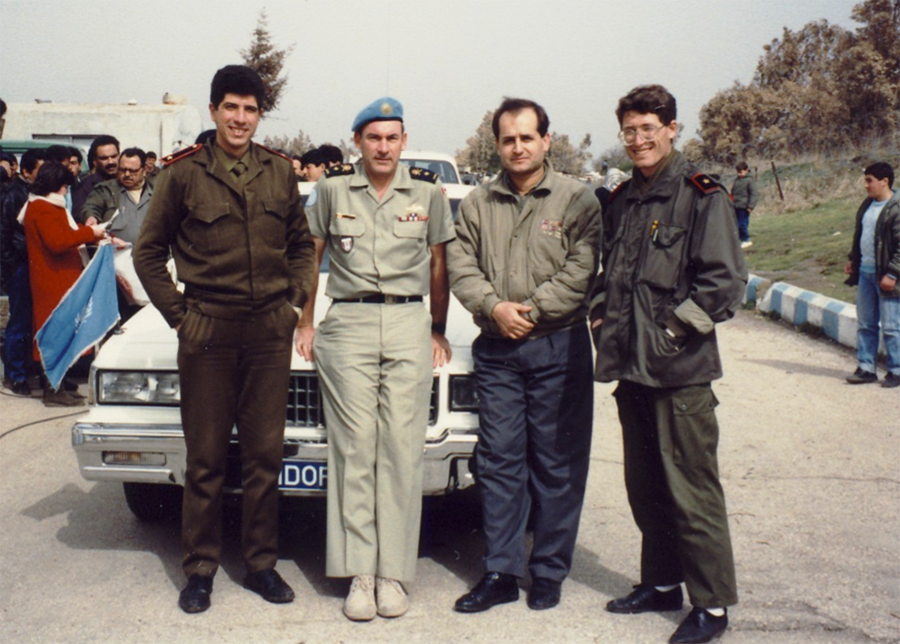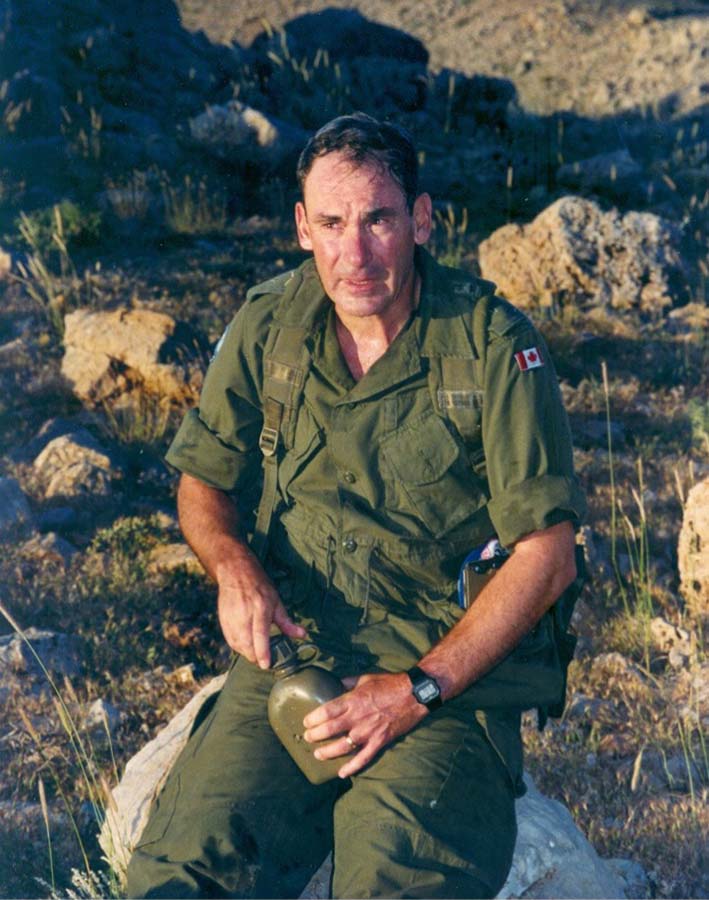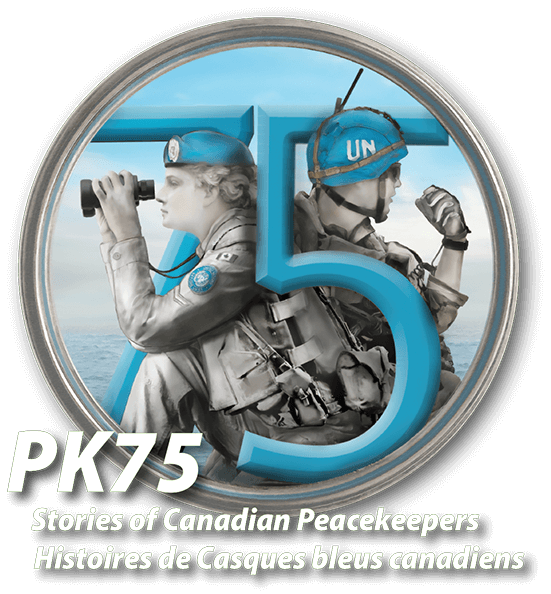

In 1990, when I was the Commander of the military facility in North Bay (ON), a decision was made to promote me to Brigadier-General and post me to the United Nations Disengagement Observer Force (UNDOF) in the Middle East, as the Chief of Staff and the Canadian Commander of all the Canadians in the United Nations Peacekeeping Forces in the Middle East. It was an interesting time in the region for a couple of reasons. First, Canada had the UN Command Position in Cyprus, in the Former Yugoslavia, and now the senior military position in UNDOF. As well, while on route to Syria with my wife Judy, the Iraqi Forces invaded Kuwait. My mother-in-law was not particularly impressed.
The United Nations Disengagement Observer Force (UNDOF) was established to maintain the agreement that ended the Arab-Israeli war in 1973, and was a ceasefire between Syria and Israel, which supervise the disengagement of Israeli and Syrian military forces and monitor the areas of separation in the Golan Heights. A third party involved was Lebanon, which not part of the treaty, but had easy illegal access to both Syria and Israel over the Golan Heights. So they were a player in the area, and had their own Palestinian conflict in progress at this time.
Up until my time of arrival in the force, times were relatively peaceful with minor incursions, but generally both sides honoured the agreement. With the Iraqi/Kuwait war and the fact that Syria was on the side of the Allies against Iraq which Borders Syria, the situation in Syria became tense. When that was developed into a combat area, the decision from Canada was to evacuate all Canadian civilians associated with the Peacekeeping Missions in the Area, as well as the nonessential staff in the Canadian Embassy in Damascus. This kept our attention until they were all out of the region, and the military settled into the region which was now at war with cruise missiles flying over Syria to explode in Israel. Really not much of a threat, to the Golan Heights, but sufficiently of concern that it had us in shelters when the missiles were launched from Iraq toward Israel.
In February 1991, the First Gulf War ground to a halt and a cease fire declared. To keep things interesting at the time, the United Nations was working with Iran and Syria to release the Western hostages held in Lebanon, some since 1985.
Although Iran was involved, the direct negotiating entities were the Hezbollah groups in Syria and Lebanon. Israeli interests were also involved, but through the United Nations. On a very late evening at the end of the Iraqi conflict I received a note from the Secretary General of the United Nations, Janvier Perez de Cuellar, indicating that a UN representative, Giandomenico (Gianni) Picco would arrive in Damascus. I was to meet him and assist as necessary. End of the Message.
In speaking with Gianni, the mission was to facilitate the release of eleven live foreign hostages and the bodies of two U.S. members who had been killed in Lebanon. The most famous names in the effort were of course British church envoy Terry Wait and American Terry Anderson. But other names, such as Americans Thomas Sutherland and Joseph Cicippio, and British journalist John McCarthy, were also important. Should you wish to read the whole story, it is in Gianni’s book: Man Without a Gun.
The simpler story is that each refugee was obtained in a turnover from the hostage-takers by a Canadian or Australian peacekeeper in Beirut, and delivered to Damascus by a Syrian envoy, met by their respective Ambassador, and flown out of Syria immediately. My job was to keep Picco from becoming a hostage to fill the void as the others left, since he was travelling to Lebanon for negotiations. The two American bodies of CIA member William Buckley, who died in captivity of a heart attack, and Colonel William Higgins, who had been a UN Peacekeeper in Lebanon but was captured and, a year and a half later, was hung in Beirut.
A little-known part of the mission was to recover Israeli Captain Ron Arad’s body. Arad had been shot down over Lebanon in 1986. The longer story is that, to get the foreign hostages out of Lebanon, after the release of John McCarthy the hostage takers were insisting on the release of Arabs being held in Israel. Israel agreed only if they got a clear accounting of what happened to their seven men who disappeared in Lebanon between 1982 and 1986. The return of Arad’s body was a clear requirement, and nobody would be released until it was in Israel. So, with assurances from Lebanon that it was indeed Arad, and since I had diplomatic clearance to cross the ceasefire line without search, I took the satchel with the bones to the Israeli’s who confirmed it was Arad. At that time the Arabs were released, and the foreign hostage releases continued.
Remembering that our real job was the supervision of the Peace Treaty between Israeli and Syria, how was that going? In a word, perfectly. With all the other activities in progress, both countries had agreed to follow the treaty to the word. Therefore, our job was to report to the United Nations Headquarters that all was well. To my knowledge, this was the only time since 1973 that the job had been so easy.
Biography
Butch Waldrum is currently retired, but until April 2014, he operated an independent consulting services company, working within the international aviation, logistics, and transportation sectors, with several Canadian and International Companies. He was a technical member of the United Nations Association of the USA (UNA-USA). Other primary clients have been American, French, Italian, Israeli, Icelandic, Bulgarian, Slovakian, Romanian, and Canadian companies. In the commercial aviation field, he operated mainly with Russian Helicopter and Fixed Winged Assets in the maintenance, logistics, support, and operations of internationally leased fleets. As a Certified Air Safety officer, he was involved in safety inspections and audits of both Eastern and Western Fleet operators and, in recent years, with concentration on the Safety Management System and Regulatory compliance.
In June 1996, he concluded three years’ service with the United Nations Headquarters, where he was the Chief of Logistics and Communications, responsible for the Engineering, Supply, Transportation, Logistic, and Communication requirements of the twenty-four Peacekeeping Missions. Before that appointment, he was responsible for the Transportation Section.
Butch had thirty-two years of service with the Canadian Armed Forces, retiring as a Brigadier-General. He commanded Canada’s Tactical Air Force Resources and was the Deputy Commander and Chief of Staff of the United Nations Disengagement Observer Force (Syria/Israel). During this time, he was involved in the release of the Western hostages from Lebanon (Terry Waite/Terry Anderson), and was the Commander of Canada’s North American Aerospace Defense (NORAD) Base. At Canada’s National Defence Headquarters, he was responsible for the Military Planning Desk involving Canada’s participation in the United Nations, NATO, and NORAD. He is the recipient of multiple awards, including the Meritorious Service Cross, Officer in the Order of Military Merit, The Canadian Forces Decoration, and is a Paul Harris Fellow — Rotary International.

Me with three Syria junior officers who manned the check point to enter the Golan Heights area from the Syrian side.

One of me actually doing my job on the mission. This one involved climbing Mount Herman. A 10,000-foot mountain between Israel, Lebanon, and Syria. All three countries touch on the top.


